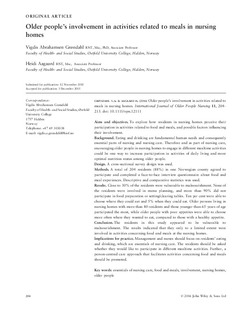| dc.contributor.author | Grøndahl, Vigdis Abrahamsen | |
| dc.contributor.author | Aagaard, Heidi | |
| dc.date.accessioned | 2018-03-19T18:55:02Z | |
| dc.date.available | 2018-03-19T18:55:02Z | |
| dc.date.issued | 2016 | |
| dc.identifier.citation | Grøndahl, V.A., & Aagaard, H. (2016) Older people’s involvement in activities related to meals in nursing homes. International Journal of Older People Nursing, 2016 Jan 25. | nb_NO |
| dc.identifier.uri | http://hdl.handle.net/11250/2491132 | |
| dc.description.abstract | Aims and objectives: To explore how residents in nursing homes perceive their participation in activities related to food and meals, and possible factors influencing their involvement.
Background: Eating and drinking are fundamental human needs and consequently essential parts of nursing and nursing care. Therefore and as part of nursing care, encouraging older people in nursing homes to engage in different mealtime activities could be one way to increase participation in activities of daily living and more optimal nutrition status among older people.
Design: A cross-sectional survey design was used. Methods. A total of 204 residents (88%) in one Norwegian county agreed to participate and completed a face-to-face interview questionnaire about food and meal experiences. Descriptive and comparative statistics was used.
Results: Close to 30% of the residents were vulnerable to malnourishment. None of the residents were involved in menu planning, and more than 90% did not participate in food preparation or setting/clearing tables. Ten per cent were able to choose where they could eat and 5% when they could eat. Older persons living in nursing homes with more than 80 residents and those younger than 65 years of age participated the most, while older people with poor appetites were able to choose more often where they wanted to eat, compared to those with a healthy appetite.
Conclusion: The residents in this study appeared to be vulnerable to malnourishment. The results indicated that they only to a limited extent were involved in activities concerning food and meals at the nursing homes. Implications for practice. Management and nurses should focus on residents’ eating and drinking, which are essentials of nursing care. The residents should be asked whether they would like to participate in different mealtime activities. Further, a person-centred care approach that facilitates activities concerning food and meals should be promoted. | nb_NO |
| dc.publisher | International Journal of Older People Nursing | nb_NO |
| dc.subject | essentials of nursing care | nb_NO |
| dc.subject | food and meals | nb_NO |
| dc.subject | involvement | nb_NO |
| dc.subject | nursing homes | nb_NO |
| dc.subject | older people | nb_NO |
| dc.title | Older people's involvement in activities related to meals in nursing homes | nb_NO |
| dc.type | Journal article | nb_NO |
| dc.source.pagenumber | 204-213 | nb_NO |
| dc.source.volume | 11 | nb_NO |
| dc.source.journal | International Journal of Older People Nursing | nb_NO |
| dc.source.issue | 3 | nb_NO |
| dc.identifier.doi | https://doi.org/10.1111/opn.12111 | |
